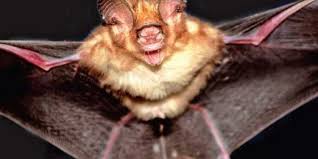
In News
The Karnataka Forest Department is pushing for a conservation plan to save a bat species found only in the Kolar region of Karnataka from getting extinct.
In-Detail
- The Kolar Leaf-nosed bat is found only in two caves of the Hanumanahalli village in Kolar District of Karnataka.
- For some unknown reasons, bats in one cave have gone locally extinct.
- Now, the KArnataka Forest Department and Bat Conservation India Trust (BCIT) are working on a conservation plan on a war footing to save the bat species from getting extinct.
- BCIT is drawing up the conservation plan and a grant has been awarded to conduct research on the bat species.
- The funding has been provided by the Habitats Trust.
- The State Government came to know about the extinction of the bats in one cave when a research was conducted by Osmania University in 2014.
- Then, the government had immediately notified the 30 acres around the caves as a protected area.
- Kolar Leaf-Nosed Bat is an endemic species.
- Very little is known about the species – its diet, ecology, behaviour, and what would be the impact on the bats if the cropping pattern changes in the region.
- In India, there are 130 species of bats, yet we know little about these mammals.
- Bats are very adaptable creatures. Hence they are not shy of living close to human habitations with many are found even in urban settlements, which makes them vulnerable.
- Due to some recent incidents, bats have gained a bad reputation as carriers of diseases.
- But, bats are absolutely crucial for the ecology as they are pollinators, their main diet being nectar.
- Plants that bloom at night are predominantly dependent on bats and moths for pollination.
- Bats also act as protectors of crops as they help in insect control.
- In the caves of Hanumanahalli, there are three to five species of bats of which leaf-nosed is one.
- As per current estimates, there are only 150 Kolar Leaf-Nosed Bats left in the caves.

Leave a Reply
You must be logged in to post a comment.